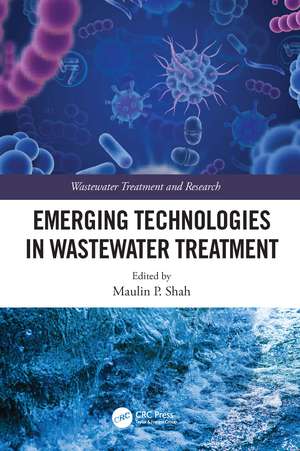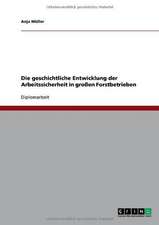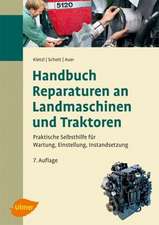Emerging Technologies in Wastewater Treatment: Wastewater Treatment and Research
Editat de Maulin P. Shahen Limba Engleză Hardback – 20 mar 2023
Features:
- The book highlights the importance of emerging technologies in the wastewater treatment plant to clean up the environment from pollution caused by human activities.
- It assesses the potential application of several existing bioremediation techniques and introduces new emerging technologies.
- It is an updated vision of the existing emerging technologies in environmental bioremediation strategies with their limitations and challenges and their potential application to remove environmental pollutants.
- It also introduces the new trends and advances in environmental bioremediation with a thorough discussion of recent developments in this field.
- Highlights the importance of bioremediation to deal with the ever-increasing number of environmental pollutants.
Preț: 656.58 lei
Preț vechi: 878.87 lei
-25% Nou
Puncte Express: 985
Preț estimativ în valută:
125.75€ • 129.56$ • 105.34£
125.75€ • 129.56$ • 105.34£
Carte tipărită la comandă
Livrare economică 24 februarie-10 martie
Preluare comenzi: 021 569.72.76
Specificații
ISBN-13: 9780367759780
ISBN-10: 0367759780
Pagini: 262
Ilustrații: 29 Tables, black and white; 27 Line drawings, color; 12 Line drawings, black and white; 1 Halftones, color; 28 Illustrations, color; 12 Illustrations, black and white
Dimensiuni: 178 x 254 x 21 mm
Greutate: 0.66 kg
Ediția:1
Editura: CRC Press
Colecția CRC Press
Seria Wastewater Treatment and Research
ISBN-10: 0367759780
Pagini: 262
Ilustrații: 29 Tables, black and white; 27 Line drawings, color; 12 Line drawings, black and white; 1 Halftones, color; 28 Illustrations, color; 12 Illustrations, black and white
Dimensiuni: 178 x 254 x 21 mm
Greutate: 0.66 kg
Ediția:1
Editura: CRC Press
Colecția CRC Press
Seria Wastewater Treatment and Research
Public țintă
Postgraduate and ProfessionalCuprins
Chapter 1: Emerging Nanotechnologies for Detection and Removal of Metal Ions from Aquatic Environment
Chapter 2: Emerging Pollutants removal using Biochar in Wastewater: A Critical Review
Chapter 3: Microbial Biofilms for Waste Water Treatment
Chapter 4: Emerging technologies and their advancements towards wastewater treatment from various industries
Chapter 5: Nanobiotechnology in wastewater treatment
Chapter 6: Emerging role of Internet of Things (IoT) for wastewater management: sensing, treatment and process optimization
Chapter 7: Advanced Technological Options for Treatment of Wastewater
Chapter 8: Electroflotation process: principles and applications
Chapter 9: Removal of Emerging Contaminants present Wastewater by Electrocoagulation Process
Chapter 10: Emerging Innovative Technologies for Wastewater Treatment
Chapter 11: Bio strategies for the removal of contaminants of emerging concern (CEC) from wastewater
Chapter 12: Nanotechnology based remediation techniques to eliminate heavy metal pollutants from wastewater
Chapter 13: Microplastics in wastewater: A review of the current knowledge on Detection, Occurrence and Removal
Chapter 14: Emerging nanofiber technology for the removal of metal ions in wastewater treatment plants
Chapter 15: Quantitative image analysis as a valuable tool to assess aerobic wastewater treatment systems
Chapter 2: Emerging Pollutants removal using Biochar in Wastewater: A Critical Review
Chapter 3: Microbial Biofilms for Waste Water Treatment
Chapter 4: Emerging technologies and their advancements towards wastewater treatment from various industries
Chapter 5: Nanobiotechnology in wastewater treatment
Chapter 6: Emerging role of Internet of Things (IoT) for wastewater management: sensing, treatment and process optimization
Chapter 7: Advanced Technological Options for Treatment of Wastewater
Chapter 8: Electroflotation process: principles and applications
Chapter 9: Removal of Emerging Contaminants present Wastewater by Electrocoagulation Process
Chapter 10: Emerging Innovative Technologies for Wastewater Treatment
Chapter 11: Bio strategies for the removal of contaminants of emerging concern (CEC) from wastewater
Chapter 12: Nanotechnology based remediation techniques to eliminate heavy metal pollutants from wastewater
Chapter 13: Microplastics in wastewater: A review of the current knowledge on Detection, Occurrence and Removal
Chapter 14: Emerging nanofiber technology for the removal of metal ions in wastewater treatment plants
Chapter 15: Quantitative image analysis as a valuable tool to assess aerobic wastewater treatment systems
Notă biografică
Maulin P. Shah is very interested in genetic adaptation processes in bacteria, the mechanisms by which they deal with toxic substances, how they react to pollution in general and how we can apply microbial processes in a useful way (like bacterial bioreporters). One of his major interests is to study how bacteria evolve and adapt to use organic pollutants as novel growth substrates. Bacteria with new degradation capabilities are often selected in polluted environments and have accumulated small (mutations) and large genetic changes (transpositions, recombination, and horizontally transferred elements). His work has been focused to assess the impact of industrial pollution on microbial diversity of wastewater following cultivation dependant and cultivation independent analysis. He has more than 280 research publication in highly reputed national and international journals. He is Editorial Board Member in CLEAN-Soil, Air, Water- Wiley, Current Pollution Reports- Springer Nature, Environmental Technology & Innovation-Elsevier, Journal of Biotechnology & Biotechnological Equipment-Taylor & Francis, Current Microbiology- Springer Nature, Eco toxicology (Microbial Eco toxicology)-Springer Nature, Geo Microbiology- Taylor & Francis , Applied Water Science - Springer Nature, Archives of Microbiology-Springer, Journal of Applied Microbiology-Wiley, Letters in Applied Microbiology-Wiley, Green Technology, Resilience and Sustainability-Springer, Biomass Conversion & Bio refinery-Springer, Journal of Basic Microbiology-Wiley, Energy Nexus-Elsevier, e Prime – Elsevier, IET Nano biotechnology-Wiley, Cleaner and Circular Bioeconomy – Elsevier, International Microbiology - Springer has edited 75 books in wastewater microbiology, industrial wastewater treatment. He has edited 20 special issues on Industrial Wastewater Treatment & Research theme on highly impact factor journals with Elsevier, Springer, Wiley, Taylor & Francis.
Descriere
Emerging Technologies in wastewater treatment plant is an ecological, profitable and natural technology designed to eliminate heavy metals, radionuclides, xenobiotic compounds, organic waste, pesticides, etc. from contaminated sites or industrial downloads through biological means.





















